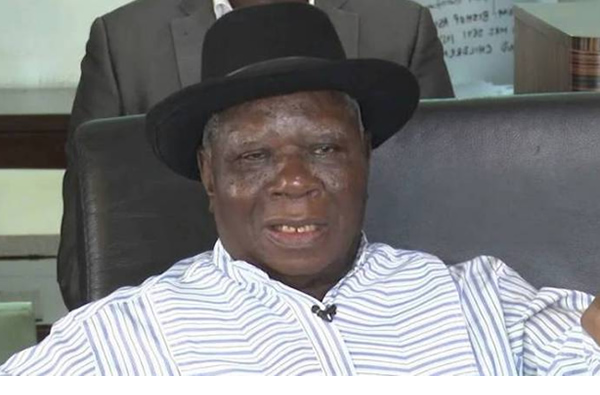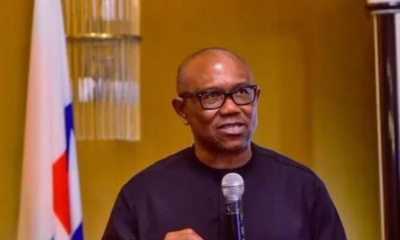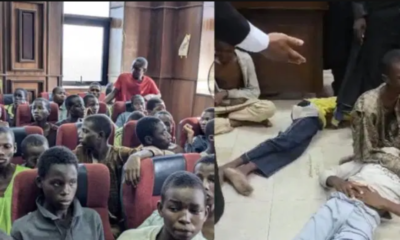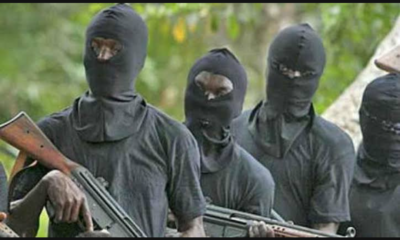News
Nigeria’ll crash with current domination of North — Edwin Clark
Elder statesman, Chief Edwin Clark, speaks to JOHN ALECHENU about Nigeria’s 60th independence anniversary, current socio-political challenges, fiscal federalism and what needs to be done to get the country working.

What do you think about the state of the nation as Nigeria celebrates its 60th independence anniversary?
At 60, we should be celebrating, despite the coronavirus pandemic. But when you look back at what Nigeria used to be in the 1950s up until 1966 when we had the first coup in this country, you would realise that things were very progressive. At the time, we had the Northern, Western and Eastern Regions and there was healthy competition among them.
Chief Obafemi Awolowo, who was the leader of the Western Region, was able to introduce free education in 1956 and build the University in Ife, Cocoa House, and the first television station in the country. Nnamdi Azikiwe in the East and Sir Ahmadu Bello in the North did similar things. At independence, we had what we called the Independence Constitution which was carried over from the colonial government and the constitution we had was what we agreed upon both in London, United Kingdom and Ibadan in the Western Region for Nigeria to be a federation. The revenues accruing from the various regions were shared according to the federal system.
You got 50 percent of what you produced in your area and the remaining 50 per cent went to the Federal Government, and other regions, including yours would benefit from the funds. This was how each region developed and they were not bitter, as far as I am concerned, up till 1966 when we had the coup.
I was part of the Midwest and the Federal Government from 1968 until 1975 when I was Federal Commissioner for Information. As of 1963, we still had a good constitution which was a carry-over from the Independence Constitution; it mirrored the same fiscal federalism (inherited from the British) and each region was developing at its own pace. But when we had the 1966 coup and counter-coup, that constitution was suspended. With the intervention of military regime, things changed and a unitary form of government emerged. All the constitutions that had been produced were abrogated. We are 60 today but we can’t compare ourselves with our contemporaries like Malaysia, Singapore and others. We have so much corruption, banditry, attacks by herdsmen on farmers and so on. Sometimes you believe that there is no rule of law. The kidnappers are not being tried. The government has so much work to do; the trial of one man is taking about five years. Then we have the issue of Fulani herdsmen who go about with AK 47 rifles, destroying farms, raping women, kidnapping and doing all sorts of things. Not a single one of them has been arrested, detained or tried. We are in trouble. Nigeria today is not united; we are divided.
The Vice President (Prof Yemi Osinbajo) was alleged to have said we have cracks in this country and that we must all do something otherwise we will break; I think that is the correct way of describing Nigeria today.
Comparing the current security situation with how things used to be, how bad do you think the security situation has degenerated?
The security of this country is in a very bad shape. For instance, Governor of Borno State, Prof Babagana Zulum, who went into service because of his love for his people, has been attacked three times by Boko Haram. The governor is doing a good job but unfortunately, our military has not been able to do enough to drive away these terrorists. Four years ago, we were told they were technically defeated but they are still there.
Today, in Kaduna; Katsina, where Mr President comes from; Kebbi; Zamfara; and Sokoto states, bandits attack people every time. The situation has become so bad that governors now go into the bush to negotiate with bandits. What type of country do we have? We are even surrendering to bandits. In the North-East, criminals are on the rampage. Our country today is very, very unsafe. The rate of kidnapping all over the country is terrible. What is there to be happy about? We are 60 as a country and we cannot say we are in a united and prosperous Nigeria.
You were in government in the 60s up till the 70s, how was the situation at the time different from that we have now?
Things were a lot better because the level of crime you see and hear about today didn’t exist at the time. The economy was better managed and most citizens enjoyed a level of comfort. Public schools, transport systems and hospitals could compete favourably with their counterparts in other parts of the world. Don’t forget that the roads, bridges and other infrastructure that were built during this time, most of them are still in use today. In fact, there is no basis for comparison with what we are seeing today.
Did you ever envisage that things could get this bad?
Never! We thought by now our country would be like Malaysia, Singapore and others which we were at par with in the 1960s. No leader would envisage a country that is not progressing; you don’t create a country purposely for it to fail.
So, where do you think we missed the plot generally as a nation?
Right from when we had military regimes; states were created by heads of state despite some of these states not meeting the basic requirements. States and local governments were created even in some areas that did not have the population to deserve such. For instance, Kano State alone has 44 local government councils. Jigawa State was carved out of Kano and while Kano has 44, Jigawa has 27. During the military regimes, heads of states took decisions like creating states and local governments to favour certain areas, some of which did not meet the criteria of having the right population and other things to deserve such. We are still paying the price for such actions.
Meanwhile, Bayelsa State, which is one of the oil-rich states, has only eight local government areas while most other states have more local government areas. When state representatives come to Abuja at the end of the month, more money goes to Kano. Even the recruitment of policemen and women is based on the number of local government areas so, while Kano is recruiting 440 policemen and women, Bayelsa is recruiting 80. What type of country are we building?
How would you describe Nigeria at the time it got independence?
It was a land we all believed in. Our founding fathers took the task of nation building seriously. Our founding fathers, led by Dr Nnamdi Azikiwe, fought against the Richard Constitution. That was the first time I heard the term – Obnoxious constitution. That was replaced by the MacPherson Constitution, which made it possible for the regions to be created to make us almost a federation. Fiscal federalism was what was in practice. Like I said earlier, each region was allowed to keep 50 per cent of revenues accruing from what it produced and the remaining 50 per cent would be shared by the Federal Government and the regions. There was a lot of money available for the development of these regions.
For instance, because of the Cocoa boom at the time, in Western Nigeria, Chief Awolowo had lots of revenue accruing to the West. He was able to introduce free primary education in 1955, establish the first television station in black Africa and build Liberty Stadium. Cocoa House was the tallest building in Nigeria at the time.
The Sardauna of Sokoto, with the money made from groundnuts, which enjoyed a high price internationally, was able to establish Ahmadu Bello University. Chief Awolowo had already established the University of Ife in 1962. They were competing without any bitterness; it was about Nigeria first. No one imposed their religion, population, tribe or politics on others. What do we have today to celebrate when Nigeria is currently the world’s capital of poverty? So many Nigerians are unemployed; our students come out of universities with no jobs. There are more Nigerian doctors who migrated abroad than those practising in Nigeria because the conditions are not good enough here. This is the state of the nation as it is today. Many of us rejoiced when we got independence in 1960 but we are sad today. People are not happy; people are grumbling.
It is difficult to differentiate between the situation we had during military regimes from 1966 to 1999 and the situation now. Our constitution made provisions for freedom of speech and freedom of movement but what is the government trying to do today? Our students cannot hold peaceful processions to air their feelings anymore. We now have a situation where if you express your views, the Department of State Services will invite you for questioning. Look at what happened to the former Deputy Governor of the Central Bank of Nigeria, Dr Obadiah Mailafia. He made a statement and he was invited and questioned by the DSS on two occasions. And when we thought it was all over, the Inspector General of Police invited him again. He is being harassed by the DSS and the police. Where is the fight against corruption, which this government says is one of its priorities? Today, there is more corruption in the country than before.
During the COVID-19 lockdown, they said the school feeding programme should continue even when there were misgivings. The Independent Corrupt Practices and Other Related Offences Commission has told the nation that over N2.5bn was traced to private accounts. Today, the former Acting Chairman of the Economic and Financial Crimes Commission, Ibrahim Magu, is in detention and is being probed. When you talk about the state of the nation, where do you start from? Those of us who are over 90 years old today cannot pretend that all is well. We are not celebrating, not because of the virus, but because of the state of our nation.
How excited and hopeful were you and others around at the time we were having the new beginning?
The motto of our founding fathers at independence was Nigeria first. They developed the regions, each going at its own pace. There was mutual trust to some extent. But today, it is different. You cannot compare our founding fathers with the type of leaders we have today. We suffer from lack of leadership today. We have religious bigots and some people want to lord it over others. Today, all the key appointments in the Federal Government are given people from to one section of the country. So, it is very difficult to have any growth. Calls by separatist groups have become louder. If you are making me a second-class citizen in my own country, then we don’t have a country.
You spoke about how well Nigeria performed when we had regional governments but you served in the regime of Gen Yakubu Gowon, who created 12 states and by a decree amalgamated resources to the central government…
That is part of what we are doing as members of the Southern and Middle Belt leaders. We formed an organisation known as Southern and Middle Belt Forum and we have been meeting here. We say this country should be restructured but some people are mischievously saying they don’t know what restructuring is. We said okay; let’s go revisit the 1963 constitution which was a federal system of government, but they said no.
In 2014, former President Goodluck Jonathan organised a national conference. I was a member and it had about 492 delegates drawn from all over the country. We had various segments of this country represented there; we made 600 recommendations to restructure the country so that everyone will have a sense of belonging. This administration, which promised change, dumped the report somewhere. The current ruling party (All Progressives Congress) set up a committee on the issue but nobody is talking about it; rather, the President has been signing executive orders. That’s why the 36 state governors recently went to court.
We want restructuring. If we do not restructure, agitations for self determination will not stop. Can you imagine a situation where two young boys in a primary school want to proceed to unity school and one had 80 per cent score while the other scored 40 and the one that scored 40 is admitted and the one that had 80 did not get admission? Or imagine a situation whereby someone who graduated with a second-class upper degree remains unemployed while the one with a pass or a third-class degree is employed? There is no equality in this country and that cannot continue. We supported the South Africans’ fight against apartheid but it is being practised here today.
Many people have blamed you and some others for being too quiet in the face of bad governance in the country, why is that?
Such people certainly don’t have someone like me in mind. I have always spoken my mind on national issues. I don’t pretend, I cannot say I am happy that Nigeria is 60. We still have a lot of challenges and the earlier we start dealing with them sincerely, the better. Otherwise, I am afraid that we will not make progress.
In our time, we contributed our quota; we fought for independence and laid a foundation. This generation also has a responsibility to contribute its quota. There is enough blame to go around but blaming the past will not solve our problems. We must take steps to make progress.
Many Nigerians blame your generation for not leaving the right legacy for the coming generations to follow and not showing good examples. How would you react to that?
Such people shouldn’t blame my generation. They should blame themselves for not knowing their rights. Today, France has a president who was 39 years old when he was elected. There were older people who were as old as his father there and some were even former presidents of France. Ahead of the 2019 presidential election, all the youths in this country had the opportunity to become president of Nigeria and they joined various political parties to contest the election, but along the way, their plans fell through. How many of the Nigerian youths now blaming us voted for them?
They (the youth) are the architects of their own misfortunes; they are not prepared to challenge what is wrong in this country because some of them are also corrupt. So, why blame their fathers or forefathers? They are following in the same footsteps of the current leaders. They are not any better. We played our part in our time, we gave them education; universities and polytechnics were established. Once you are educated, you are expected to stand on your own. Graduates today are roaming around, following politicians as thugs. How do you become a leader the way you are going? They should not blame us.
Former President Olusegun Obasanjo and Prof Wole Soyinka recently said the country was drifting towards a failed state and that the President, Major Gen Buhari (retd.) was divisive, do you agree with them?
That meeting Obasanjo presided over, I was part of it. We were very well consulted. I couldn’t go because of my age and the coronavirus, but I was fully represented. When I said I was represented, I meant the people of the South-South were fully represented. Afenifere, Ohaneze Ndigbo, and the Middle Belt group were all there. When someone said the country was not sinking, we laughed and asked if it was because they were enjoying and dominating others. What about those who are at the base? What Obasanjo said was part of our communiqué.
Do you see any hope for the future of the country?
We are not hopeless. Hope is what is keeping most Nigerians alive today – the hope that tomorrow will be better. We must however take deliberate steps to turn that hope into a reality. We can still build this nation when we consider Nigeria first and not where we come from or what religion we practise.
Let’s stick to the truth, return this country to true federalism as it was in 1963 where every state or region enjoyed some form of autonomy and regions or states controlled a reasonable amount of their resources and gave some to the Federal Government. We should be able to build trust among one another. Let us have a country where we are all equal citizens, where no one is superior to the other. Let’s not impose one religion on people or consider it as superior to the other. We are a multi-religious country. Let there be respect for one another; let us practise justice and equity when we do that and we will see a progressive Nigeria. If we do not do that and continue the way we are going now, we will crash just like former President Obasanjo and Prof Soyinka have said.
No citizen must be treated as a second-class citizen; we should all be treated as equals before the law. The ordinary Nigerian must be able to get justice when they approach the judiciary or go for arbitration.
-

 Love & Relationship2 days ago
Love & Relationship2 days agoBike man chooses lady over ₦10k, vows to send his wife away (Video)
-

 News2 days ago
News2 days ago“Church has to be dismantled in Nigeria, I go to church and believe in God but we can’t have it that people stays in church Monday to Friday, morning till night” – Peter Obi Lament
-

 News2 days ago
News2 days agoEndBadGovernance protest: “Minors fainting in court was a deliberate script to draw negative reaction” – Police says
-

 Crime2 days ago
Crime2 days agoAnambra woman loses her three sons to cult-related attacks







